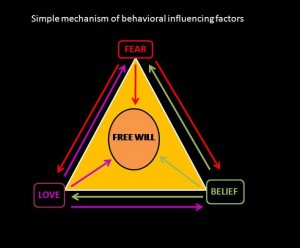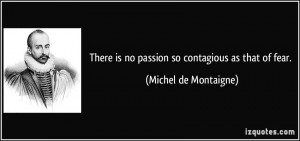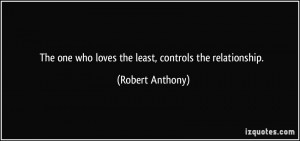All living things are psychologically controlled primarily by three important factors: the powers of fear, belief, and love—and the mutually generating interaction between them, which in turn influence (and are influenced in return by) a living being’s needs and wants.
And when it comes to humans, a fourth factor comes into the picture: the power of freewill. The influence of these powers hold strong because of one simple truth of life: That the natural state of all living beings, basically, is that of discontent – because life itself is unfair, riddled with the struggle to fulfill one’s wants and needs.
Look around you. Are all living beings naturally happy? As long as a living thing is dictated by its “needs” (the greatest need of every living thing being the need to survive) – it will be unhappy.
The reason why living beings are unhappy in their natural state is because every living being is dependent in some form of the other on something, and the greatest dependency every living thing experiences is on its basic needs for its survival.
No creature is omnipotent, or self-sufficient in the truest sense: the most basic dependency a creature has is on food, without which it would perish. All forms of life exhibit a relentless struggle for survival, which both influences and is influenced by the factors mentioned above.
A simple example of the working of these factors
Watch the video below, and notice these factors working silently in the background:
The ratsnake unknowingly(or fearlessly) ventures into the cobra’s territory because of the belief that it could acquire its prey, i.e. the rat. The rat is its need (food), and is thus necessary for the ratsnake’s sustenance. The love for its own survival (through the acquisition of its sustenance) overcomes the ratsnake’s fear of the unknown, which influences it to move into unknown territory.
But when confronted with the cobra, the ratsnake retreats in fear – this time out of the fear of its own death, and again for the love for its own survival. Just like as in the wild, these factors and the interaction between them, also dictate human behavior with the addition of free will.
Understanding the influence of these factors
Napoleon Hill in the chapter “The Mystery of Sexual Transmutation” from his best seller Think and Grow Rich talks about “The Ten Mind Stimuli”:
The human mind responds to stimuli, through which it may be “keyed up” to high rates of vibration, known as enthusiasm, creative imagination, intense desire, etc. The stimuli to which the mind responds most freely are:–
1. The desire for sex expression
2. Love
3. A burning desire for fame, power, or financial gain, MONEY
4. Music
5. Friendship between either those of the same sex, or those of the opposite sex.
6. A Master Mind alliance based upon the harmony of two or more people who ally themselves for spiritual or temporal advancement.
7. Mutual suffering, such as that experienced by people who are persecuted.
8. Auto-suggestion
9. Fear
10. Narcotics and alcohol
From the list, fear, love and autosuggestion (in the context as the process by which a person induces self-
1. The power of fear
Fear: an unpleasant emotion caused by the threat of danger, pain, or harm.
Fear is possibly the most powerful of all emotions. Not only because of its intensity, but because of its wider and complex influence everywhere. It has evolved in every creature primarily to warn and protect its existence—yet in mankind, especially in blue pill modern civilization, a modern day fear can be even absurd.
The most common fears a person fears are the fear of ridicule, fear of failure, fear of pain, fear of rejection, fear of losing something precious, and so on. But the most powerful of all fears are commonly the fear of the unknown and the fear of death.
Fear, a master but often misunderstood emotion, is not necessarily bad; harnessed constructively, it can propel a person to incredible feats of achievement. But what is often seen are its negative, destructive and often paralyzing effects on life, leading to a world consumed by anger, resentment, drama, hate, fighting, and sadness.
Fear is often the mother emotion of anger (and violence): for where there is fear found, there is bound to be anger (and violence, either verbal or physical) found. Understanding the power of fear, and how it can affect us (both positively or negatively) is possibly one of the most important lessons to begin the journey of self-empowerment.
Leaders (or tyrants) in the past and present have understood the incredible impact of fear in influencing the masses, and its catalyzing ability to birth (or magnify already present) negative emotions in the masses for their own benefit.
Once you successfully provoke a person’s fears, you easily influence his or her’s adrenaline response (flight or fight). Fear is thus used generously to influence the human mind through societal indoctrination, media, literature and violence unabatedly in today’s world.
Look at the state of modern religion (and devotees) today throughout the world, irrespective of faith. A question which often comes to mind when scrutinizing the state of the faith of mankind today:how many people truly say their prayers out of love for God, rather than actually out of a fear of God?
There is often an undeniable stark difference in the piety of the God-loving, and that of the God-fearing. And how many pray out of a true fear of God, rather than a fear of social ridicule of being called ‘irreligious’?
The power of fear, reveals itself even in the numbers and nature of the pious today, and not only in political or the general social sphere today. The power of fear is more ‘universal’ than even the power of love.
“Here a question arises: whether it is better to be loved than feared, or the reverse. The answer is, of course, that it would be best to be both loved and feared. But since the two rarely come together, anyone compelled to choose will find greater security in being feared than in being loved. . . . Love endures by a bond which men, being scoundrels, may break whenever it serves their advantage to do so; but fear is supported by the dread of pain, which is ever present.” – Niccolo Macchiavelli, The Prince
2. The power of love (or desire)
Love: a strong feeling of affection, or a great interest and pleasure in something.
The emotion of love is directly opposite to, but can also directly influenced by the emotion of fear.
“Find out each man’s thumbscrew. ‘Tis the art of setting their wills in action. It needs more skill than resolution. You must know where to get at anyone. Every volition has a special motive which varies according to taste. All men are idolaters, some of fame, others of self interest, most of pleasure. Skill consists in knowing these idols in order to bring them into play. – Baltasar Gracian (1601-1658)
A ‘thumbscrew’ is described as a person’s weakness, in the context above. It could be anything, but usually deals with either the person’s fears, or loves. The power of love and the power of fear are often intricately linked. Most people often fear losing what they love, and these things are what constitute their “pressure points”. Finding and squeezing them, results in involuntary power transfer to the one who exercises the pressure.
The power of “love” (not romantic love alone), just like the power of fear, can either work for success or destruction in a person’s life.
Being deeply loved by someone gives you strength, while loving someone deeply gives you courage. – Lao Tzu
One can easily substitute “someone” by “something” in the above quote, and see the same result.What you ‘love’ doing or experiencing can have tremendous impact on your life, either for good or bad. A person who is a slave to his desires, can easily be controlled through the fulfillment of his desires by the one who fulfills them.
Love, just like fear, is thus a dangerous two edged sword, which works either way; birthing both positive and negative emotions including anger, violence, hate and prejudice. Since most people are not in control of their emotions, stirring up their emotions is the easiest way to control them.
STIR UP WATERS TO CATCH FISH
Anger and motion are strategically counterproductive. You must always stay calm and objective.But if you can make your enemies angry while staying calm yourself, you gain a decided advantage. Put your enemies off balance: Find the chink in their vanity through which you can rattle them and you hold the strings. – Law 39, The 48 Laws of Power
3. The power of belief
Belief: an acceptance that something exists or is true, especially one without proof- or- trust, faith, or confidence in (someone or something).
What ever the mind of man can conceive and believe, it can achieve. – Napoleon Hill (1883-1970)
The power of belief is arguably the most important power regulating all behavioral patterns – for it regulates and influences both the powerful forces of both fear and love, and even often free will.
We are born believing. A man bears beliefs as a tree bears apples. – Ralph Waldo Emerson
As the saying goes: Everything goes – if belief (or faith goes). Having a belief (or trust) about something or someone is a belief, while choosing not to believe (or trust) is also a belief. Belief (or a lack of it) often dictates action. Influence people’s beliefs and you’d influence their fears and loves – which would in turn influence their actions.
Robert Greene in The 48 Laws of Power elaborates on the power of belief in society through two important laws:
PLAY ON PEOPLE’S NEED TO BELIEVE TO CREATE A CULT-LIKE FOLLOWING
People have an overwhelming desire to believe in something. Become the focal point of such desire by offering them a cause, a new faith to follow. Keep your words vague but full of mist; emphasize enthusiasm over rationality and clear thinking. Give your new disciples rituals to perform, ask them to make sacrifices on your behalf In the absence of organized religion and grand causes, your new belief system will bring you untold power. – Law 27, The 48 Laws of Power
and
PLAY TO PEOPLE’S FANTASIES
The truth is often avoided because it is ugly and unpleasant. New appeal to truth and reality unless you are prepared for the anger that comes from disenchantment. Life is so harsh and distressing that people who can manufacture romance or conjure up fantasy are like oases in the desert: Everyone flocks to them. There is great power in tapping into the fantasies of the masses. – Law 32, The 48 Laws of Power
Humanity has always been, is and always will be, a slave to the power of its beliefs.
A simple example explaining the power of belief would be that of game. Gaming is not just getting into a woman’s panties; it’s more about influencing her ‘beliefs’ about yourself, so that intimacy with her would become a more definite possibility. In the seduction of the masses, the synergy between love, fear and belief is best explained.
Thus, whether it may be through religion, social or political dogma, the power of belief (or lack of it) is possibly the most important catalyst in human behavior. Manipulating a person’s beliefs about something or someone either through trickery is possibly the oldest subtle form of warfare that mankind has probably known.
People are by nature changeable. It is easy to persuade them about some particular matter, but it is hard to hold them to that persuasion. Hence it is necessary to provide that when they no longer believe, they can be forced to believe. – Niccolo Machiavelli, The Prince
A wise man proportions his belief to the evidence.– David Hume
The power of belief itself is what determines and directly influences both fear and love, and sometimes vice-versa. Whether fear would yield anger and courage, instead of paralysis and cowardice, is all what the one who experiences fear, believes in at that particular moment. It’s his belief patterns which determine how he would perceive his situation.
Altering a person’s beliefs through suggestion or manipulation (either verbal or visual), alters his or hers perception of the reality around him or her, and thus influences his or hers emotions and logic (and most importantly free will), which would then in turn influence his or her eventual behavior.
4. The power of free will
Free will: the power of acting without the constraint of necessity or fate; the ability to act at one’s own discretion.
Arguably but unfortunately, the power of freewill often trails the power of belief in influencing human behavior solely because most people usually don’t exercise their free will (or free thought) in today’s world – where prejudices (per-conceived ignorant beliefs), fears, and loves usually tend to supersede free will.
An artist is forced by others to paint out of his own free will.– Willem de Kooning
This necessarily may not be bad, but blind (or forced) faith is as dangerous as having no faith (or belief) at all. Yet sometimes even, in spite of the lack of faith, fear, or love, most people fail to exercise the true potential of free will.
Free will is an illusion. People always choose the perceived path of greatest pleasure.– Scott Adams
People demand freedom of speech as a compensation for the freedom of thought which they seldom use. ― Soren Kierkegaard
Thus, it’s common to see people not completely understanding the power of freewill. Yet, often people don’t completely exercise free will because of their own fears, loves and personal and social beliefs. The herd mentality is a common example of that.
Most people live their lives by yielding to different kinds of “traps” (Harry Browne in his best seller “How I Found Freedom In An Unfree World” calls such “traps” as “assumptions that are accepted without challenge”, listing fourteen of them), and thus might still not be completely exercising their free will while enjoying a superficial “freedom.”
Most people are not psychologically free due to their fears, loves and beliefs, and thus their servitude (and slavery) can be acquired through leading them more down the roads to these traps. Leaders throughout history have acquired power over people through this way. Alter people’s perception of reality, limit their free will so as to control their ability to judge for themselves, and thus call the shots to their eventual behavior.
CONTROL THE OPTIONS: GET OTHERS TO PLAY WITH THE CARDS YOU DEAL
The best deceptions are the ones that seem to give the other person a choice: Your victims feel they are in control,but are actually your puppets. Give people options that come out in your favor whichever one they choose. Force them to make choices between the lesser of two evils, both of which serve your purpose. Put them on the horns of a dilemma: They are gored wherever they turn. – Law No.31, The 48 Laws of Power
Conclusion
The secret to a balanced personality is moderation, which entails regulated satisfaction of one’s wants and needs – which is possible through self-mastery. The masterful man who is in control of his emotions, (his fears, loves), and beliefs is very difficult to influence, and has the freedom to maximize the potential of the freewill at his disposal.
However in today’s world, people usually struggle to find the right balance for their emotions, which reveals itself as a weakness which can be influenced (or exploited) depending on the circumstances that the people are in.
Most people are slaves to their own volition, which can be subdivided into their fears, loves, and beliefs. Probe to influence these factors in their personalities, and then you could sufficiently influence them.
WORK ON THE HEARTS AND MINDS OF OTHERS
Coercion creates a reaction that will eventually work against you.You must seduce others into wanting to move in your direction.A person you have seduced becomes your loyal pawn. And the way to seduce others is to operate on their individual psychologies and weaknesses. Soften up the resistant by working on their emotions, playing on what they hold dear and what they feel: Ignore the hearts and mind of others and they will grow to hate you. – Law No.43, The 48 Laws of Power
The secrets to understanding and influencing human behavior are thus often basic (which can be understood by the factors above), and simply controlling these factors is often the simple way to influencing others and gaining mastery over them.
Read Next: Robert Greene’s Mastery






“Altering a person’s beliefs through suggestion or manipulation (either verbal or visual), alters his or hers perception of the reality around him or her, and thus influences his or hers emotions and logic (and most importantly free will), which would then in turn influence his or her eventual behavior.”
Waaaaa!?
I had to re-read that statement a few times as well. The excessive pronoun use throughs of the intended meaning drastically. It is the equivalent logic which allowed several native tribes to not acknowledge boats or pictures on first sight. This is also geared towards long term implants. Say I want you to be loyal to me for life. I would have best been served to have memories tethered to you from your most suggestible states. Childhood seems the most logical. This is directly why hypnotists thrive off of regression. Your minds pliability and eagerness to learn then, helps create long term behaviors that will dictate how your personality operates.
You start with the core personality. Give a few memories that influence your basic desires. Love, companionship, food, all strike a chord. Create a longing and void. And you now train someone to operate in a way to fill that void. Simple stuff really. Short term pain. Long term slave.
Edit: the key is to make the person think the pain is long term, so as to make the new behavior long term. Before long, someone will do something out of fear and have no idea why they do it. And once it is set, most can’t change.
Post-modern writing style ?
terrible writing style.
“his or her” politically correct writing style
Stay away from marriage, organized religion, and the two-party system. It’s very difficult to be corrupted when the fear of “hell”, the idea of “love”, bogus beliefs in the flying spaghetti monster, and the illusion of “choice” in politics are of no concern to you.
Kick back, relax, put your feet up, and enjoy the decline.
Good points made, and now we are living in the era where we realize that no woman loves a man, I wonder how that theory will be perceived?
Every red pill male in America who refuses to vote republican is responsible for the collapse of America’s greatness in my opinion, because you God damn know every feminist and pajama boy fahgett is enthusiastically voting for them democrats.
Do you oppose them or not? Do you care if they win or not?
All it takes for evil to triumph is for good men to do nothing
I vote for whomever benefits me. That’s more red pill than just blindly serving conservative masters.
What do you believe in then? Men have to believe in something. For some reason, when men are prone to nihilism or hedonism, rates of depression and suicide go through the roof. And then there’s the old adage “If you stand for nothing you’ll fall for anything.” Sometimes, being manipulated isn’t the worst outcome.
No longer believing in a lot of the exposed and outdated principles (marriage, service, hard work is rewarded, etc.) doesn’t mean you believe in ‘nothing’ necessarily. Hubert says don’t believe in;
-marriage
-religion
-two-party system
That leaves a lot of other things you can still believe in.
I doubt he’s saying “Don’t vote,” That takes twenty minutes every few years. I think he’s more likely saying, ‘Don’t make your chosen political party and their talking points into one of your daily emotional pillars’
Marriage….What’s to ‘believe’ in there? It’s a sucker’s bet. The rat snake heading into the cobra’s territory in the video is about the perfect metaphor here.
Silly little rat snake (man) wants to eat a mouse (get pussy) runs into the cobra (women with the state at their back) who needs to eat him to stay alive. (this is the feminine imperative that stokes itself with men’s lives, extracts resources, digests them and craps them out as a shell of what they once were)
Religion- Everyone has to make their own call here.
Beautiful
Agree, why kick up feet and enjoy a decline. That’s what the enemies want you to do – join them or be subdued (aka, accepting the decline). You only live once, give it your best fight.
“Let them hate us, as long as they fear us” Caligula.
Caligula: the madman who only lasted four (4) years in power.
Augustus
27 BC – 14 AD
Tiberius
14–37 AD
Caligula
37–41 AD
Claudius
41–54 AD
Does the power of love explain why men here in NY are letting their women force them to stand on lines in the cold to pay nine bucks for bone broth(its like awesome for your skin)??
That must be it, right?
Fear is an element there.
The power of fear
Frankie Goes to Hollywood’s lesser known hit
I prefer The Power of Love
Fear. Men hold too much fear.
The fear in your bones when you attend a job interview or ask out a pretty girl has nothing to do with the fear of those particular scenarios.
It’s an evolutionary hangover from the fear of being clubbed and cannibalised by rival tribes.
Fear is mostly residual. I believe it’s why so many first world people are anxious and depressed. Because we have nothing left to fear in our everyday lives
“Suffering is the sole origin of consciousness.”
–Fyodor Dostoyevsky
Suffering is a gift from God to refine you. If you not been gifted with suffering, then one should be daily making themselves suffer in pursuit of bettering their spirit, mind, and/or body:
This is why Orthodoxy has the most noble view of man and the afterlife, as opposed to say Islam whose reward would be relaxing and fornicating and consuming, our Heaven is spending eternity becoming better and better, going from strength to (more) strength, never going backwards but various degrees of forward in relation to your own effort.
Thank you for the post. Incredible!!
Recognition that the individual units that make up mankind are largely irrelevant for the most part. Slow mutations may occur but generally human society is much more like a monolithic hive mind than anything else. Understanding the base needs of the average man and accessing those needs appropriately will give you quite a position of power and privilege, no matter how brutal or arbitrary your rule becomes. But who cares? That’s for the history textbook anyway. Individualism is a key strategy for success however though, even if these individuals come along slowly, a few can come in and change everything.
There are other things too like reading body language and other techniques that I’ve found that can make fitting in with most piece a piece of cake. I can understand by looking at most people(at least Americans) what they’re thinking/feeling without them saying a word. To command authority your body language must transmit your ability to commit authority. A crossed-armed person with bad posture looking down and away with no eye contact is not going to inspire much confidence. The secret is in body language, non-verbal, but also having a greater understanding of the needs/wants/demands of the greater human species. Then you can carve your kingdom.
Film Star Douglas Fairbanks selling Liberty Bonds in the main picture. Charlie Chaplin was at the same event.
http://imgur.com/gallery/MDhGN
The reason why living beings are unhappy in their natural state is because every living being is dependent in some form of the other on something, and the greatest dependency every living thing experiences is on its basic needs for its survival.
—————-
humans have a dependency on the approval of others, which is the root of many problems.
And approval is becoming more and more outdated. Of course you have to have a boss’s approval. But a lot of the approval wiring in your mind was established with a lot more at stake than now. If you saw a sneer from the leader of your little hunting pack 10,000 years ago then you were likely dead. If the captain of your ship 150 years ago didn’t like you and the food was gone and the wind had died for weeks…well. But these days, with a decent demeanor and a modicum of social tact you should be okay. Yet all of that supercomplex wiring finds its way into the mix. People suffer for decades over family status, slights, rejections and its not a big deal but that wiring is on full blast, wrecking lives that don’t need to be wrecked. I try to track my own thoughts as well as I can. I try to understand which ones have approval or disapproval at their root and just let them die. Some good old memory of being cool to some people. A terrible old memory of trying too hard in front of a girl. All hell. And all actually quite boring to think about. Drop as much of those approval-based paradigms as possible. Approval is the anti-life.
I think greed is a big motivator
“Greed” it’s a negatively connotated word. Levitt and Drubner proved in Freakonomics though that all human behavior is governed by incentives. ALL
See Adam Smith.
Greed is an extension of self-interest, and self-interest is the engine of civilization
“Greed is good” – Gordon Gekko
*gives a standing ovation*
Amazing article!
ROK has been doing a great job with these articles of 2015!
Yesssss!
Sales 101, basically.
OK, maybe not 101, but still…
Free will is an illusion. People always choose the perceived path of greatest pleasure.- Scott Adams
False. Demonstrably false on so many fronts that it’s hilarious that Adams could say this with a straight face. Of course, he was a cartoonist, so take his words with the huge shaker of salt that they deserve.
The oldest subtle form of warfare , indeed .
Very great article, Oscar. Exactly what I needed.
Enjoyed the premise and presentation of the article. A bit more complicated than it needs to be.
There are two types of motivation: noble(for others/reason-based) and ignoble(for self/instinct-based).
One is driven only by fear and its permutations centered mainly on self-preservation/gratification (fear of loneliness, fear of death, fear of humiliation, etc.).
The other is of the “divine potential in all of man” for compassion (self-sacrifice, guardianship of the weak, seeking a balance, etc. or truly acting against natural/base instincts.).
Free will is exercised in the choice of which type of motivation to follow and owning the consequences of the decisions we do make.
Fear is a very effective way to influence the masses. People have been doing it for ages, and even today. Some politicians in Europe instill irrational fear in people by creating ridiculous scenarios about Russia or Muslims taking over Europe. And guess what? The masses buy it! Fear combined with nationalism is the magic formula for the rise of fascism.